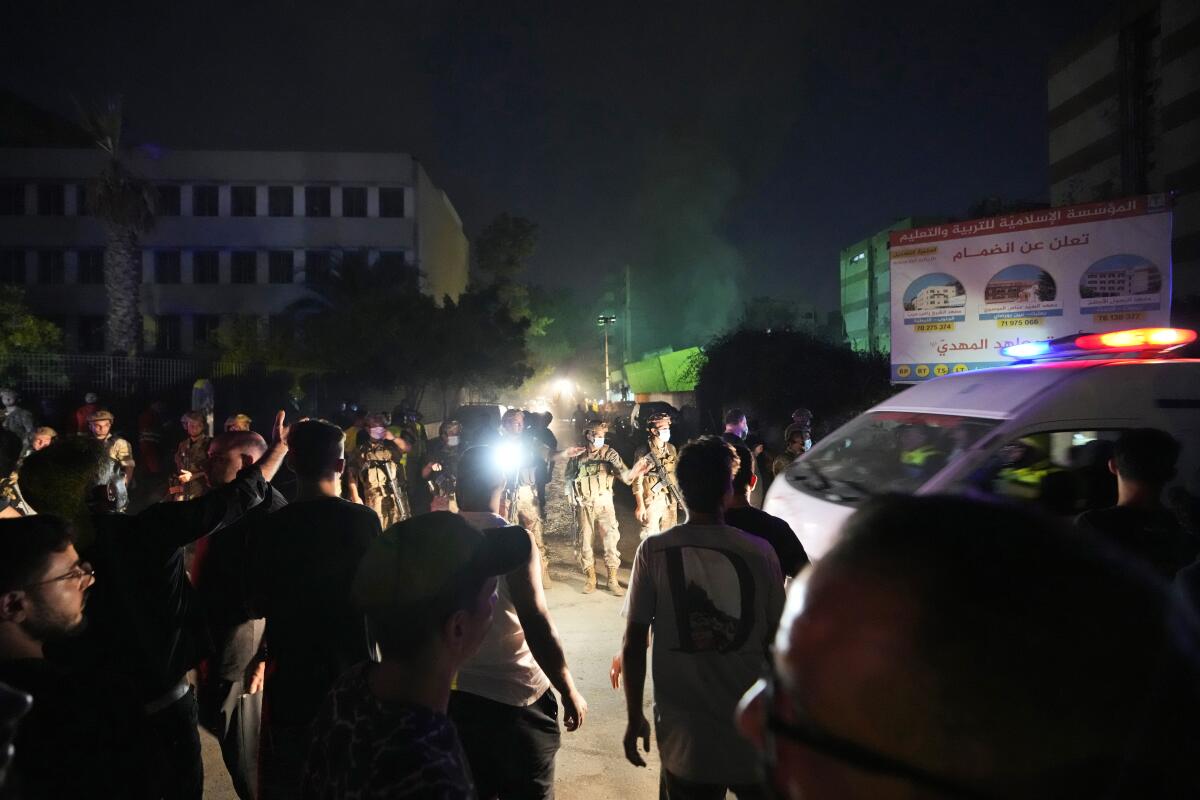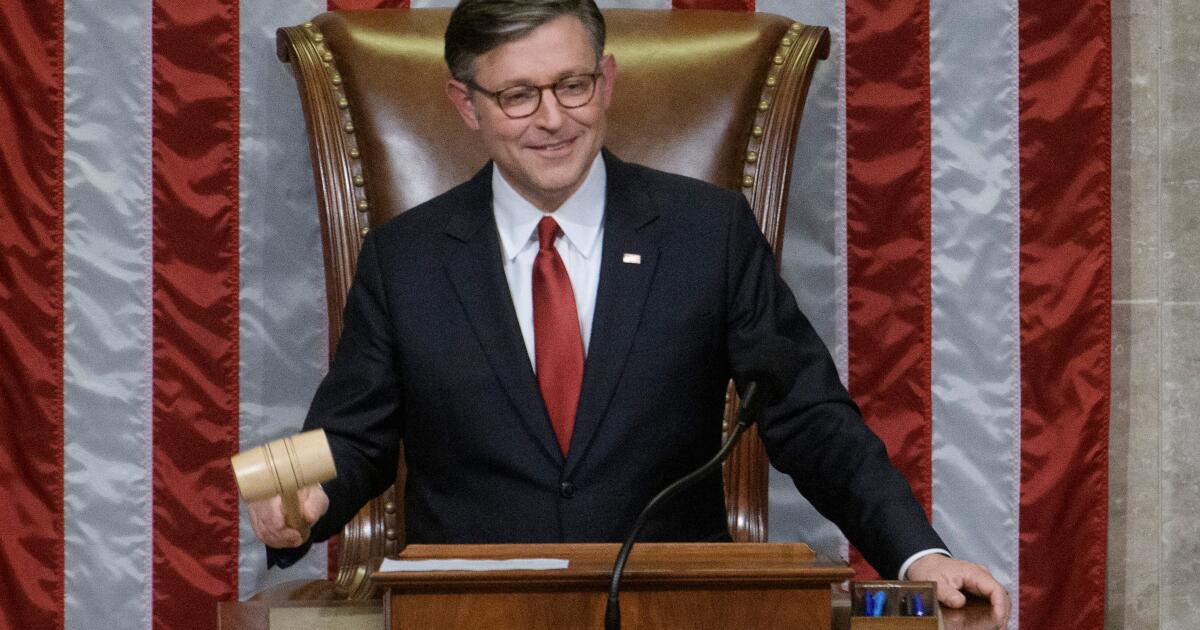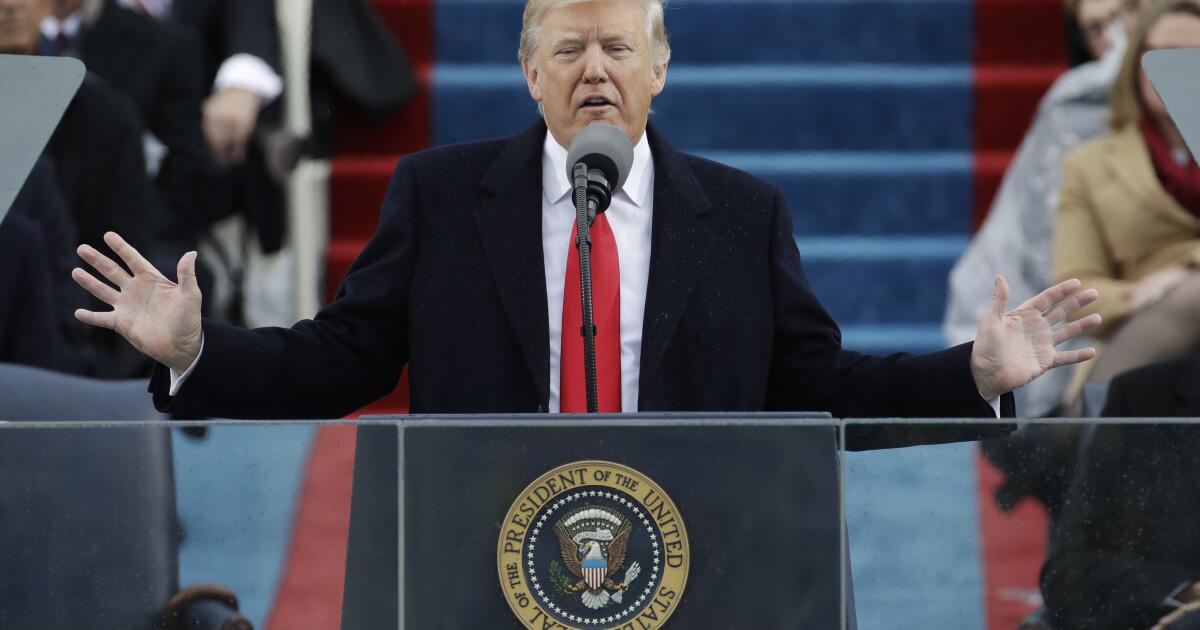BEIRUT —
Offering no hint of respite in its head-on confrontation with Hezbollah, Israel on Friday staged a deadly bombing raid in a crowded Beirut district, aiming to destroy the militant group’s subterranean headquarters and kill its top leader.
The Israeli military called it a “precise strike” targeting the concealed headquarters of Hezbollah.
The powerful blasts — around nine or 10 in quick succession — shook windows across the city, destroyed four buildings and left a plume of smoke rising over the city. Nearby apartment buildings were engulfed in flames and craters could be seen on nearby roads.
It was the largest strike on the Lebanese capital since hostilities erupted between Israel and Hezbollah nearly a year ago, intensifying a conflict that already threatens to spiral out of control.
Lebanese authorities said six people were killed and 91 wounded, but predicted the casualty figures would rise as rescue crews worked through the rubble.
Israel’s campaign against Hezbollah has escalated sharply over the last two weeks, including attacks using sabotaged communication devices, strikes aimed at senior commanders and hundreds of airstrikes targeting launch sites for rockets and missiles inside Lebanon.
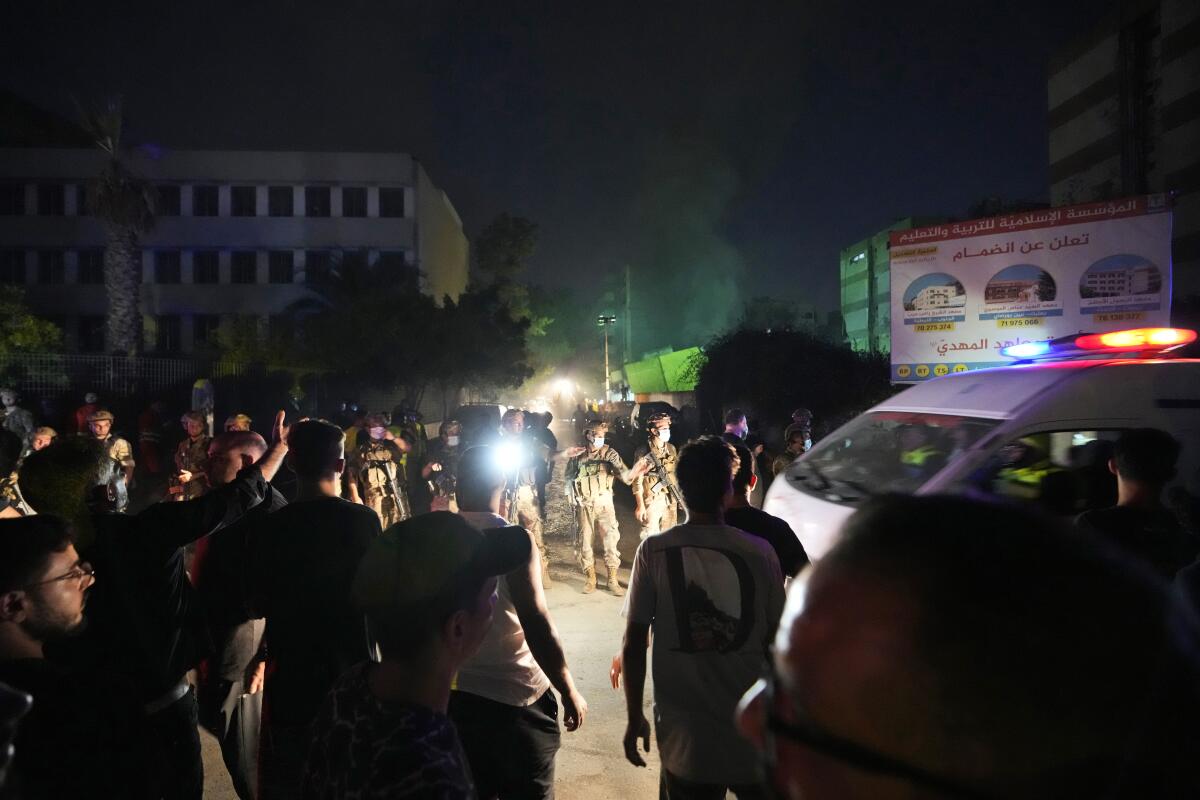
Rescuers arrive near the site of an Israeli airstrike in Beirut’s southern suburbs on Friday.
(Hassan Ammar / Associated Press)
The Israeli military did not specify whether Hezbollah chieftain Hassan Nasrallah, who last week had harshly denounced the recent Israeli attacks and vowed revenge, was a target. Multiple Israeli news reports quoted Israeli officials saying he was.
Several reports, including from Al Arabiya news, suggested he had survived. Hezbollah did not issue a statement about the leader.
In the hours after the attack, the group announced rocket barrages at Safad and areas in the north of Israel.
Shortly before the Beirut blasts, Israeli Prime Minister Benjamin Netanyahu delivered a combative address at the United Nations, pledging to continue attacks against Hezbollah, which is backed by Iran.
“As long as Hezbollah chooses the path of war, Israel has no choice, and Israel has every right to remove this threat and return our citizens to their homes safely,” he told the world body.
He said Israel would “continue degrading Hezbollah” until its military aims were met.
In Israel, Netanyahu’s office said he would cut short his U.S. visit and return to Israel. The White House said President Biden had been briefed on the situation, and the Pentagon said the United States did not have advance warning of the strike.
Netanyahu’s remarks, and the scale of Friday’s strike, appeared to dash any immediate hopes for an internationally backed cease-fire. The Biden administration and its allies had floated the idea of a 21-day truce, a proposal to which Hezbollah had not responded. In his speech, Netanyahu did not mention the truce plan, either.
Recent weeks have raised fears of a wider regional conflagration, and the Israeli leader, in his U.N. speech, issued a stark warning not only to Iranian proxy groups such as Hezbollah, Hamas and the Yemen-based Houthi rebels, but to Iran itself.
“If you strike us, we will strike you,” Netanyahu said. “There is no place in Iran that the long arm of Israel cannot reach, and that’s true of the entire Middle East.”
The strike in the Dahieh district came only an hour after thousands of people had attended the funeral in another Beirut suburb of three Hezbollah members, including a senior commander, who were killed in earlier attacks.
Lebanon’s acting prime minister, Najib Mikati, said he would cut short his trip to New York to attend the U.N. meeting and return to Lebanon, according to a statement from his office. He said he would hold an emergency cabinet meeting upon his return.
The Iranian embassy in Beirut issued a statement on the social media platform X, saying ”there is no doubt that this reprehensible crime and reckless behavior represent a dangerous escalation that changes the rules of the game.”
Dahieh, a neighborhood where Hezbollah holds sway and has many of its offices, is one of the most densely populated parts of the capital. Rear Adm. Daniel Hagari, a spokesman for the Israel Defense Forces, said the target was the main Hezbollah headquarters, which he described as a subterranean complex situated underneath residential buildings.
Hagari said Hezbollah intentionally located the headquarters beneath the buildings so as to use those living there “as human shields.”
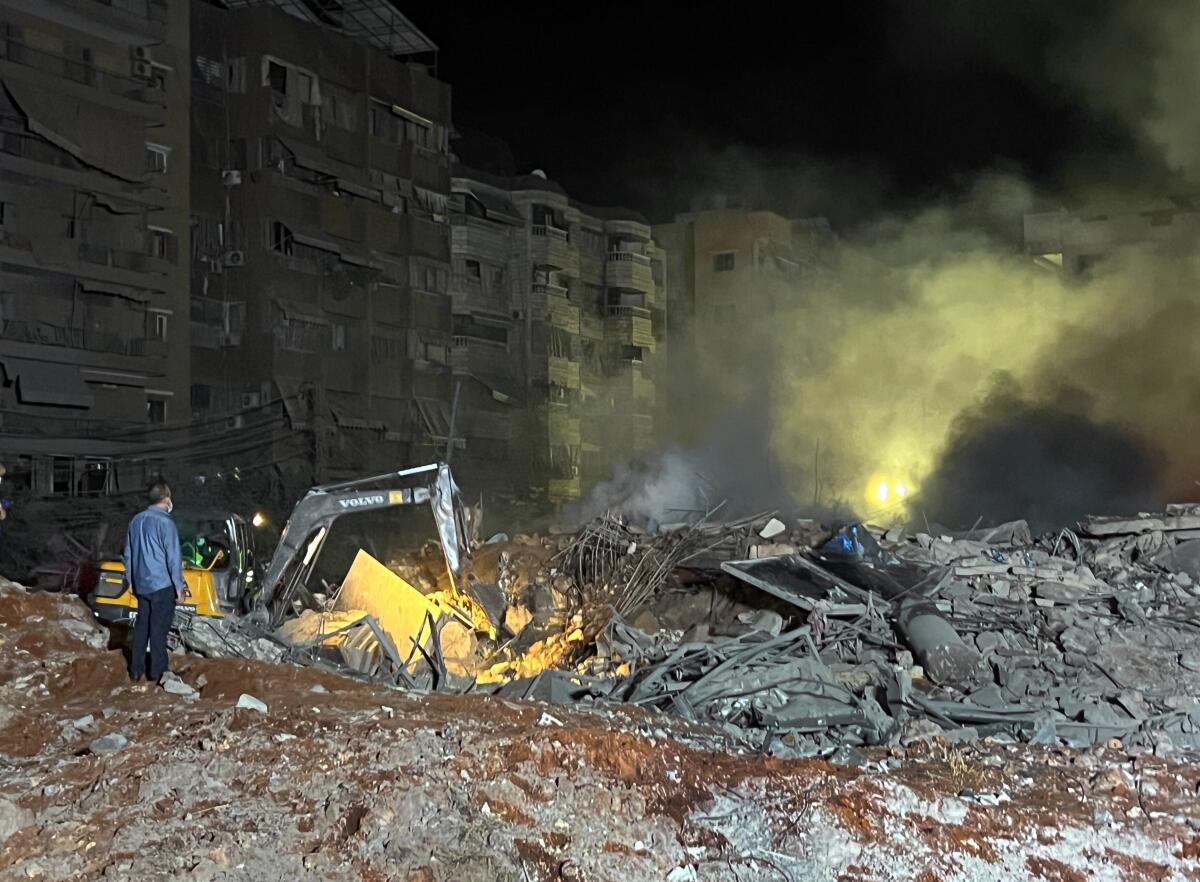
The Israeli military called the bombing a “precise strike” targeting a concealed central headquarters of Hezbollah.
(Nabih Bulos / Los Angeles Times)
As rescuers began combing piles of smoldering rubble, ambulances, firetrucks, water-trucks, a large excavators and loaders rushed to the scene. Authorities and Hezbollah fighters swiftly cordoned off entrances to the area, turning back most of those who tried to enter.
At the site itself, the ground appeared to have flipped upside down, with mounds of dirt and rock where the buildings had once stood. Nearby buildings had windows and walls blown out. At the edge of the site, a crevasse had opened, swallowing a tree. A large excavator scooped up the rubble, while a fire billowed in the background.
Hours after the strike Friday, the Israeli military’s Arabic-language spokesman Avichay Adraee said in a post on social media that residents in three areas of the Dahieh should leave their homes “immediately.”
“You are located near Hezbollah interests and for your safety and the safety of your loved ones, you are forced to evacuate the buildings immediately and stay at least 500 meters away from them,” Adraee wrote on X.
The targeted area is close to a Palestinian refugee camp, Burj Al Barajneh, and the early-evening blasts sent residents fleeing with whatever they could carry. Hundreds streamed to the highway nearby, trying to find any vehicle to take them to the south.
“I’m going to send my kids away from here,” said Khaled Asaad, 35, a painter from eastern Syria who was sitting on a rolled-up mattress by the street with his 4-year-old daughter, Fiddhah, on his lap.
The strike, he said, shook everything in the house and left his three daughters terrified. Staying in the refugee camp, a labyrinthine slum with cramped buildings and narrow alleyways, used to be safer than being in Syria, Asaad said. But that had changed now.
“Even after all the war in Syria, it’s still safer than here,” he said.
The strike comes after more than 11 months of tit-for-tat fighting on the Lebanese-Israeli border. In recent weeks Israeli warplanes have launched withering strikes across Lebanon’s south, east and northern regions.
Even before Friday’s strike, the death toll in Lebanon this week had risen to at least 720, according to Lebanon’s health minister. The ministry does not differentiate between combatants and civilians, but said many women and children were among the dead.
Hezbollah began its rocket attacks on Israel a year ago, almost immediately after the Palestinian militant group Hamas attacked southern Israel last Oct. 7, killing about 1,200 people and triggering a catastrophic war in the Gaza Strip that has killed some 41,000 Palestinians, according to health officials in the territory.
Hezbollah said it was acting in solidarity with the Palestinians and with Hamas, which like it is backed by Iran, and said its attacks would continue until there was a cease-fire in Gaza. Repeated U.S.-backed attempts to reach one have failed.
As the anniversary of the Gaza war approaches, tensions have been running high inside Israel, where tens of thousands of residents remain displaced from the northern border as well as small communities near Gaza.
On Thursday night, sirens blared and thousands of Israelis scrambled for shelters as a Houthi ballistic missile was aimed at the center of the country. It was intercepted by Israeli defenses before reaching Israeli territory, authorities said. Another attempted ballistic missile strike earlier this week, this one by Hezbollah, targeted Tel Aviv.
Times staff writer Laura King reported from Washington.
